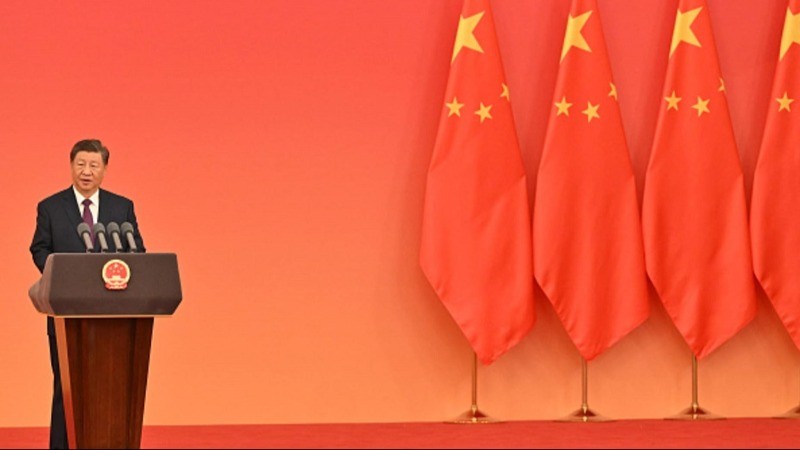
China celebrated its 75th National Day on Tuesday, with President Xi Jinping issuing a serious warning about the difficulties that lie ahead for the country. He noted that China faces economic challenges alongside escalating tensions with the United States and its neighbors, including India. A large crowd gathered at Tiananmen Square in Beijing for the ceremonial flag hoisting, marking the occasion with a week-long holiday, but there were no major festivities or military parades like those seen during the 60th and 70th anniversaries.
Instead, Xi emphasized the need for the Chinese people to prepare for tough times. “The road ahead won't be smooth and flat; there will be difficulties and obstacles. We might face high winds and rough seas, even stormy seas,” he said at a banquet before the anniversary, as the nation seeks to recover economic momentum amid geopolitical challenges.
He urged vigilance during peaceful times and called for close cooperation among the Communist Party, the military, and all ethnic groups in China. “No difficulties can stop the Chinese people from moving forward,” he said.
Xi, who is currently in his unprecedented third five-year term, leads the Party, the military, and the Presidency. He is expected to remain in power for life. The People's Republic of China (PRC) was established in 1949 after the Communists, led by Mao Zedong, defeated the nationalists, who retreated to Taiwan, now a self-governing democratic island.
Despite 75 years since its founding, the integration of Taiwan remains a key agenda for the Communist Party, particularly for Xi, who has vowed to reunite it with China. In his banquet speech, he reiterated that “Taiwan was China's sacred territory,” and he warned against any moves toward Taiwan's independence.
Xi also focused on revitalizing China’s economy, which has struggled due to a downturn in the property market, leading to significant financial losses. He committed to pursuing reforms and opening up the economy, which has been hindered by stagnant domestic consumption, a struggling property sector, and high tariffs on Chinese electric vehicles and batteries imposed by the US and the EU.
The Chinese government has announced several measures, including interest rate cuts, aimed at restoring economic momentum and addressing rising unemployment, a significant concern for the ruling Party.
Analysts believe that China's economic slowdown could affect its global strategic initiatives, like the Belt and Road Initiative (BRI), which involved substantial investments in smaller countries. Post-COVID, many of these investments have led to accusations of creating "debt traps," prompting countries facing economic crises to seek debt relief from Beijing.
On the strategic front, the growing rivalry with the US, territorial claims in the South China Sea, and maritime tensions with Japan over the East China Sea are creating additional challenges. The Philippines, supported militarily by the US, has been involved in conflicts with China over these claims, while Vietnam, Malaysia, Brunei, and Taiwan also have overlapping territorial disputes.
Additionally, the military standoff between India and China in eastern Ladakh has persisted for over four years. Although both countries have engaged in diplomatic and military discussions that led to some disengagement from specific friction points, efforts continue to resolve the remaining areas and improve India-China relations.